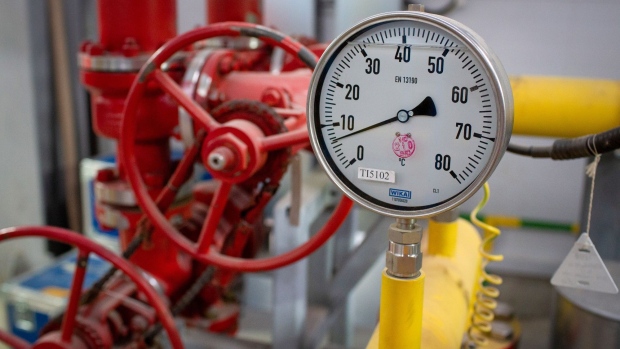Jul 27, 2022
Ukraine Latest: EU Braces for Gazprom to Cut Nord Stream Supply
, Bloomberg News

(Bloomberg) -- Gazprom PJSC is expected Wednesday to halve natural gas supplies via its most important link to the European Union to about 20% of capacity, in a move that could test the bloc’s unity five months after Russian President Vladimir Putin invaded Ukraine.
EU member states agreed on Tuesday to cut their demand for gas by 15% over the next eight months, but some countries may be reluctant to make sacrifices for Germany, which failed to diversify energy sources while lecturing southern nations on putting their fiscal houses in order, according to a senior EU diplomat who asked not to be identified to discuss a confidential issue.
Turkey said grain exports from Ukrainian ports could resume within a week and reach 25 million tons by the end of the year, after it brokered a deal between Kyiv and Moscow that eased fears of a global food crisis.
(See RSAN on the Bloomberg Terminal for the Russian Sanctions Dashboard.)
Key Developments
- Turkey Says Ukraine Grain Exports Could Start Within a Week
- Russian Gas Cuts Risk Reviving Old EU Divisions This Winter
- Kremlin to Keep Up Its Gas Squeeze on Europe, Insiders Say
- Russia Turns Gas Turbines Into Bargaining Chips in Energy Fight
- Ukraine’s Fight to Rebuild in Face of Unrelenting War
- U.S. Senators Call for Sanctions on Russian Oil Sales to China
On the Ground
Ukraine continued its offensive in the south, striking the main bridge that connects the city of Kherson to Russian-occupied territory across the Dnipro River. The region’s Russian-installed authorities said the link was shut after the attack. Ukraine retook two villages in the area, its southern command said. Elsewhere, Russia shelled Dnipropetrovsk region overnight and hit Ukraine’s second-largest city of Kharkiv with missiles, according to local authorities. Ukraine’s military said fighting was ongoing in the Bakhmut district of the Donetsk region.
(All times CET)
Turkey Says Grain Shipments Could Start Within a Week (8:00 a.m.)
The exact timing of when grain exports begin will be determined by logistical groundwork, Turkish President Recep Tayyip Erdogan’s spokesman, Ibrahim Kalin, said in an interview Tuesday.
Kalin dismissed concerns that a Russian missile strike on Odesa’s port after the deal was reached would undermine the agreement. Turkey is due to open a joint operations center with Ukraine, Russia and the United Nations on Wednesday to coordinate trade under the agreement.
As many as 100 vessels carrying grain and agricultural products were trapped in Ukrainian ports when war broke out.
Microsoft, Michelin Take Hits From Russia Pullbacks (6:30 a.m.)
Microsoft Corp. said its decision to scale back in Russia after the start of the war led to charges of $126 million. French tiremaker Michelin, which suspended operations in the country after the invasion, took a 202 million euro ($205 million) hit from its exit.
Over 1,000 companies have voluntarily curtailed or suspended operations in Russia beyond what is legally required since the invasion, according to economists at Yale University. McDonald’s Corp. announced a $1.2 billion charge this week after it sold its Russian business.
U.S. Senators Call for Sanctions on Russian Oil Sales to China (12:30 a.m.)
Republican Senators, including Marco Rubio and Rick Scott, introduced a bill to sanction China’s purchases of oil and other energy supplies from Russia in an effort to cut off funding for the Kremlin’s war against Ukraine.
The bill would impose penalties on any entity insuring or registering tankers that ship oil or liquefied natural gas to China from Russia, according to Rubio’s office.
China’s imports of Russian crude have surged this year as the world’s biggest energy consumer picked up discounted barrels that European buyers had shunned.
©2022 Bloomberg L.P.







